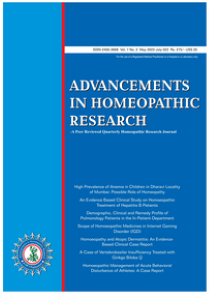Efficacy of Pulsatilla Nigricans in Children with Acute Respiratory Infections (ARI) : A Retrospective Cohort Study
Keywords:
ARI, Antimicrobial resistance, PulsatillaAbstract
In India, ARI accounts for 30-50% of pediatric outpatient attendance and 20-40% of hospital admissions. Data on ARI from rural & urban areas in India is inadequate. ARI and their complications are the most frequent cause of antiviral/antibiotic prescribing in primary care. With multi resistant organisms proliferating, appropriate alternative treatment to these conditions is urgently required. These infections are self limiting in nature but the symptoms can be distressing. Many treatments are used to control symptoms and shorten the duration of illness but they often have minimal benefit and may lead to adverse effects. It has a high cost to society, being responsible for school absenteeism, unnecessary medical care and early over exposure to allopathic medicines (antihistaminic, antipyretic, antiviral, antibiotics, decongestants & steroids) resulting into antimicrobial resistance. Multiple studies were found in which Homoeopathic medicines were used to treat ARI’s where Homoeopathic treatment was found effective with faster resolution and that too without the use of antibiotic or antiviral treatment. Homoeopathy offers a viable alternative therapeutic solution for acute respiratory infections and their complications. During data collection it was observed that amongst other medicines Pulsatilla is the most frequently used medicine in ARI. Therefore, the present study was initiated to investigate the efficacy of Pulsatilla in children with acute respiratory infections (ARI).




